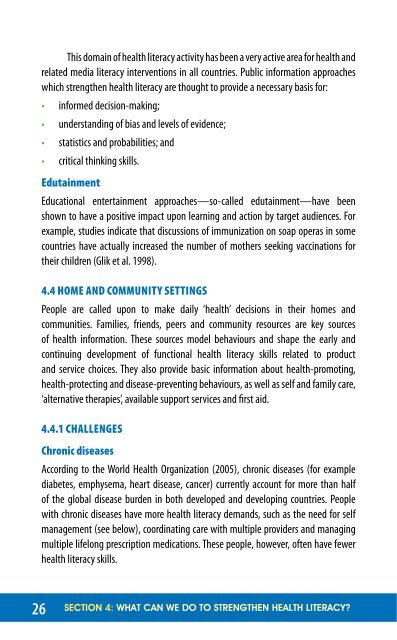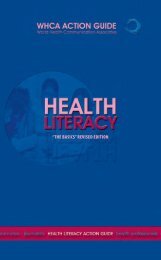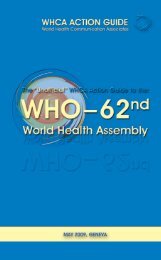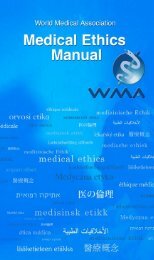Part 1 'the basics' - World Health Communication Associates
Part 1 'the basics' - World Health Communication Associates
Part 1 'the basics' - World Health Communication Associates
You also want an ePaper? Increase the reach of your titles
YUMPU automatically turns print PDFs into web optimized ePapers that Google loves.
This domain of health literacy activity has been a very active area for health and<br />
related media literacy interventions in all countries. Public information approaches<br />
which strengthen health literacy are thought to provide a necessary basis for:<br />
• informed decision-making;<br />
• understanding of bias and levels of evidence;<br />
• statistics and probabilities; and<br />
• critical thinking skills.<br />
edutainment<br />
Educational entertainment approaches—so-called edutainment—have been<br />
shown to have a positive impact upon learning and action by target audiences. For<br />
example, studies indicate that discussions of immunization on soap operas in some<br />
countries have actually increased the number of mothers seeking vaccinations for<br />
their children (Glik et al. 1998).<br />
4.4 home and community settings<br />
People are called upon to make daily ‘health’ decisions in their homes and<br />
communities. Families, friends, peers and community resources are key sources<br />
of health information. These sources model behaviours and shape the early and<br />
continuing development of functional health literacy skills related to product<br />
and service choices. They also provide basic information about health-promoting,<br />
health-protecting and disease-preventing behaviours, as well as self and family care,<br />
‘alternative therapies’, available support services and first aid.<br />
4.4.1 challenges<br />
chronic diseases<br />
According to the <strong>World</strong> <strong>Health</strong> Organization (2005), chronic diseases (for example<br />
diabetes, emphysema, heart disease, cancer) currently account for more than half<br />
of the global disease burden in both developed and developing countries. People<br />
with chronic diseases have more health literacy demands, such as the need for self<br />
management (see below), coordinating care with multiple providers and managing<br />
multiple lifelong prescription medications. These people, however, often have fewer<br />
health literacy skills.<br />
26<br />
Section 4: wHat can we do to StrenGtHen HealtH literacy?






